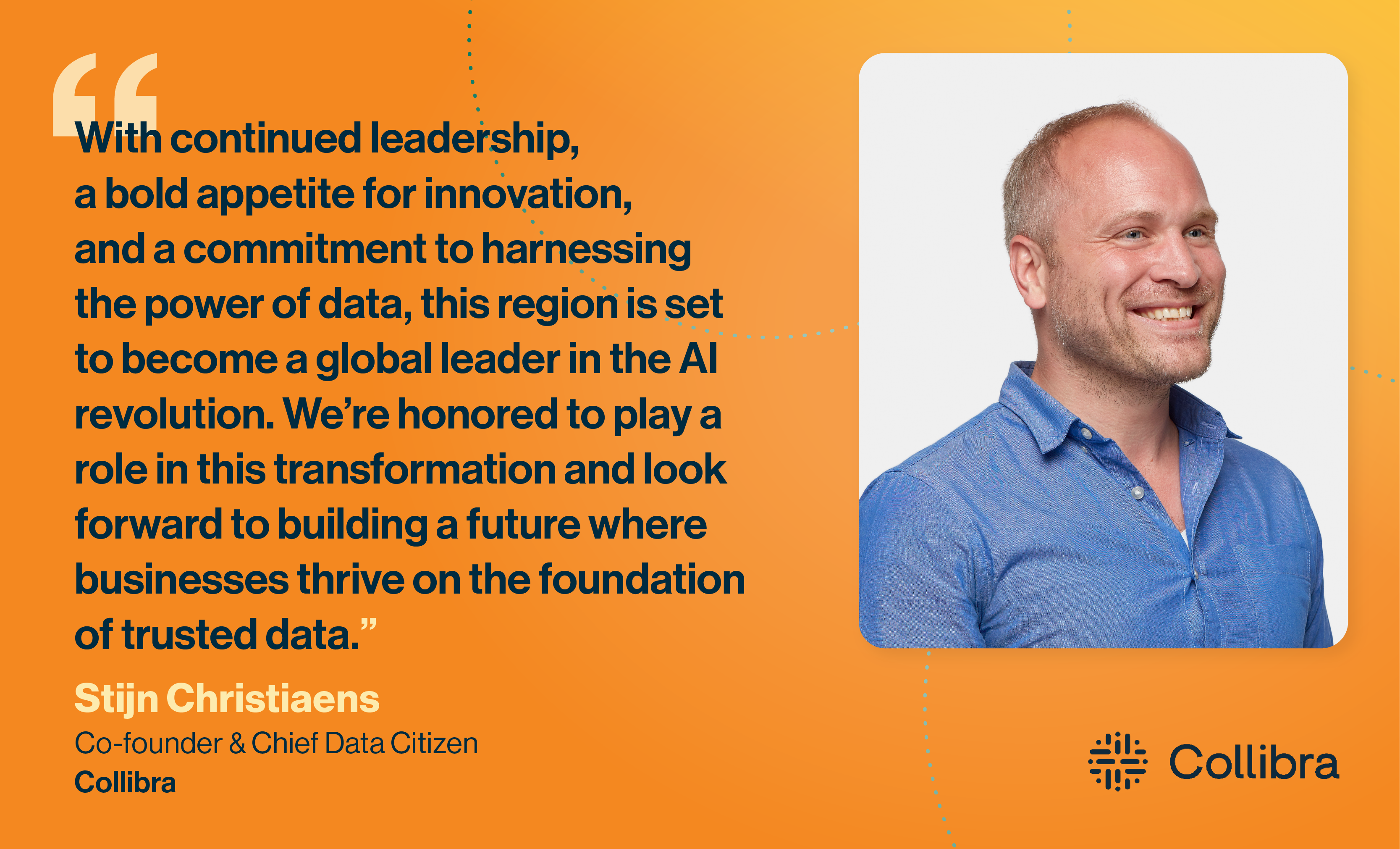Last week at our Data Citizens ‘22 conference in San Diego, we were thrilled to welcome customers and partners from around the world to connect, learn from one another, and share our vision for the future of data. As the go-to event for all things data intelligence, it was the perfect place to launch our new wave of products and capabilities for Collibra Data Intelligence Cloud to make it easier than ever for everyone to find, understand, trust and access their data. It was our best conference yet.
Since we started Collibra in 2008, it has been incredible to see how our community has grown and how the data ecosystem has evolved. There has been so much change and innovation. We’ve seen the rise of big data and self-service analytics, the advance of AI, the shift to the cloud, the rise of the Chief Data Officer and the Chief Analytics Officer – and along with that, ever-increasing levels of scrutiny and regulatory pressure.
The world around us has also continued to change. Today, organizations are under enormous pressure to drive top-line and bottom-line impact to their business, to get closer to their customers, and to stay one step ahead in a difficult and uncertain economic environment.
We are at an important inflection point.
The pace of change and innovation will continue to unlock powerful technologies like AI, new paradigms like Data Mesh, and countless opportunities for progress – with data. But all of this change and innovation also comes with significant challenges. We are seeing crushing levels of complexity, with more diversity, fragmentation and distribution of data than ever before. Issues of data privacy, data security, sensitive data, data access management and data ethics are top of mind. How to ensure productivity while controlling risk is a real challenge.
Recently I had a conversation with the CTO of a large financial institution. The company is leveraging AI to change the way they interact with their customers and to be able to bring totally new services and products to market. They expect AI to drive billions of dollars of top line and bottom line to their business in the coming years, fundamentally changing the company. Data plays a huge role in making this strategy a reality.
But data is also their biggest constraint. For their strategy to be successful, they need to be able to bring a new AI/ML model to production within 3-4 months. Today, it takes them over 6 months just to get the data ready to be able to build the model. That includes finding the data, understanding it, making sure that the quality is right, that it’s fit for purpose, that there is no bias in the data, and that they are allowed to use it from a legal perspective.
I hear a version of this story in many conversations with customers. It resonated with many of our guests at the conference last week. Every organization has the opportunity to transform its business through data. We – the data leaders and data practitioners – have the power to make this inflection point work for us, so we can drive more innovation, more efficiency and productivity, get closer to our customers and stay one step ahead. But how?
We believe that a new approach to data is needed: a system of engagement for data.
To be successful, we need to embrace the pace of innovation around data and learn how to support the increasing complexity, diversity and fragmentation of data – at scale. At Collibra, we don’t believe that this can be achieved through centralization – we know this doesn’t work. And it cannot be done at the infrastructure layer alone, because that just leads to more complexity, more silos, more risk and less productivity for any organization.
To succeed, we believe that a new approach to data is needed. It is based on the idea that all of us can and should be able to manage data strategically through a single system of engagement to deliver trusted data to all users, all use cases, and across all sources.
A single system of engagement for your data allows you to get a full view across your entire data landscape and make relevant data available to all of your data citizens – making your business analysts, data stewards, data engineers, data scientists and data privacy team more effective. It also allows you to stay in control – to know what data is used where, who is accessing it and why, and make data available while complying with ever-increasing levels of scrutiny.
This is incredibly powerful. When every single person in your organization is able to find, understand, trust and access data, you can do truly amazing things. One of our customers, Heineken, is embracing this new approach with Collibra to power their transformation goals.
There has never been a better time to embrace this new approach to data.
This means driving change. And as we all know, driving change is rarely easy. I have learned that having a forcing function makes it easier. Today’s environment – with ever-growing levels of complexity of data and scrutiny on productivity, efficiency and risk – is that forcing function. Now is the time.
As data leaders and data practitioners, what you do now has the potential to determine the future of your organization. You can make a massive difference if you help everyone in your organization find, understand, trust and access data – at scale.
Together with our partners, we are here to help you turn this inflection point into an unprecedented opportunity, so that you and everyone in your organization can thrive with data.
We can’t wait to see what we’ll be able to accomplish together.




